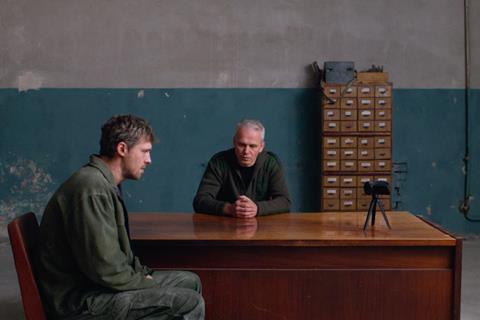A singularly brutal film from the uncompromising and brilliant Valentyn Vasyanovych

Dir. Valentyn Vasyanovych. Ukraine. 2021. 125 mins.
Film-makers have explored a thousand and one ways to tell us that war is hell – but few have plumbed the inferno to such a forensically chilly effect as Ukrainian writer-director-cinematographer-and–editor Valentyn Vasyanovych. After scoring a powerful – if somewhat marginal – critical hit with 2019’s Atlantis, Vasyanovych returns to the same topic of conflict in Ukraine, in a film that is rigorously executed, unflinching in its depiction of atrocity, and more than somewhat oblique in its overall thrust.
Admirers of the slow and uncompromisingly challenging will embrace this as the hard-case real thing.
Yet Reflection, his fifth fiction feature, is a remarkable work from a remarkable director who is perhaps still weighing up the demands of uncompromising rigour and those of accessibility. Prospects may be not just niche but micro-niche (it’s likely to appeal in the same way as Beginning, Dea Kulumbegashvili’s recent gnomic critical success), but admirers of the slow and uncompromisingly challenging will embrace this as the hard-case real thing.
Where Atlantis imagined a near-future Ukraine reduced to an uninhabitable wasteland by the toxic effects of war, Reflection is set in 2014, at the start of Ukraine’s war with Russia. Sergiy (Roman Lutskyi) is a surgeon and father of teenage Polina (Nika Myslytska), whose mother Olga (Nadia Levchenko) is now with soldier Andriy (Andriy Rymaruk). After Polina wonders why her father hasn’t signed up for the army, Sergiy joins the war effort, with horrifying results. Accidentally straying into enemy territory, he’s captured and tortured by Russian forces – but when his medical abilities are called on, he encounters Andriy, who is in an even worse position.
Sergiy’s descent into the abyss provides the bare bones of the film’s sparse narrative. But it is the content, and the fearless execution, that demands audiences sit up in their seats – and at times, feel like hiding behind them. The film is executed in some 25 tableaux, in largely static shots of varying lengths, some quite short, others extended to durations calculated to test the viewer’s nerve. Most of these shots are static, presented with dead-on frontal symmetry, as if we’re watching events on a stage – giving some action the detached, but heightened quality of ritualistic performance. Other shots move the camera to abruptly disorienting effect. A prime example, which will rattle even the most blasé viewer, is the extended scene in which Sergiy is greeted by a Russian officer playing good cop (Ihor Shulha) before the heavies move in; just when you think the scene has reached its painful limits, Sergiy is frogmarched off, camera following, down flights of stairs, into a labyrinth of corridors, to endure and witness worse things still.
Presumably basing his drama on accounts of real-life atrocity, Vasyanovich doesn’t pull his punches, nor mercifully turn the camera away (and even given stunt effects, the actors are asked to endure a lot). But you might say the really painful moment comes after this sequence, in a grimly ironic touch: a lorry marked with the Russian slogan ‘HUMANITARIAN AID’, but with contents that are anything but benign.
It’s when Sergiy returns home that things take an oblique turn. We see him alone in his comfortable but austere flat, curled up on his sofa in exactly the same position as on his prison bed (Vasyanovych’s staging is nothing if not meticulous). A symbolic thread is introduced by a pigeon crashing into a window, leaving a mark that’s later smeared to suggest something more elusive – a soul in flight, perhaps, as Sergiy and Polina have a somewhat Dostoevskian discussion about conceptions of the soul. A riding lesson, a toy drone, an ominous jogging incident all function to perplexing – or, from another perspective, tantalising – effect.
Vasyanovych has shot and edited Reflection himself, and his hands-on perfectionism, sense of timing and use of carefully composed space suggest definite affinities with, or the influence of Sweden’s king of slow, Roy Andersson - as well aesthetics shared with Myroslav Slaboshpitskiy’s 2014 Cannes hit The Tribe, which Vasyanovych produced. While his visuals are in a much more strictly realistic register than Andersson’s, Vasyanovych plays his hand super-coolly, and the pacing of some scenes – such as Sergiy’s session painstakingly cleaning his LPs – almost suggest a glimmering form of deadpan comedy. But comedy and absolute seriousness can be the inverse and obverse of slow cinema, and it’s fascinating here to see effects familiar from Andersson – that blurry bird trace could be right out of his films – used to entirely different purpose. A visual leitmotif also involves sequences with much of the action seen through windows and other glass divides, sometimes blurred by heavy rain or glaring light: a case here not of the fog of war, but its obscuring glare.
This is a singularly brutal film, not just in content but in its demands on the viewer, although quite how effectively it reflects the reality of the Ukrainian situation is something for the experts to assess. Even adepts of the more confrontational strain of contemporary art cinema may feel that Vasyanovych risks diminishing his art by over-playing his effects – a debate sparked in the past by, for example, Amat Escalante’s Mexican drug war drama Heli. But there’s no doubt that Vasyanovych is a film-maker of uncompromising boldness and brilliance, and we should watch his progress with considerable interest – and not a little trepidation.
Production companies: Arsenal Films, Forefilms
International sales: New Europe Film Sales, jan@neweuropefilmsales.com
Producers: Iya Myslytska,Valentyn Vasyanovych, Vladimir Yatsenko, Anna Sobolevska
Screenplay/cinemagotraphy/editing: Valentyn Vasyanovych
Production design: Vladlen Odudenko
Main cast: Roman Lutskiy, Nika Myslytska, Nadia Levchenko, Andriy Rymaruk
























